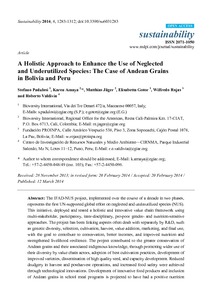A holistic approach to enhance the use of neglected and underutilized species: the case of Andean grains in Bolivia and Peru
Abstract
The IFAD-NUS project, implemented over the course of a decade in two phases, represents the first UN-supported global effort on neglected and underutilized species (NUS). This initiative, deployed and tested a holistic and innovative value chain framework using multi-stakeholder, participatory, inter-disciplinary, pro-poor gender- and nutrition-sensitive approaches. The project has been linking aspects often dealt with separately by R&D, such as genetic diversity, selection, cultivation, harvest, value addition, marketing, and final use, with the goal to contribute to conservation, better incomes, and improved nutrition and strengthened livelihood resilience. The project contributed to the greater conservation of Andean grains and their associated indigenous knowledge, through promoting wider use of their diversity by value chain actors, adoption of best cultivation practices, development of improved varieties, dissemination of high quality seed, and capacity development. Reduced drudgery in harvest and postharvest operations, and increased food safety were achieved through technological innovations. Development of innovative food products and inclusion of Andean grains in school meal programs is projected to have had a positive nutrition outcome for targeted communities. Increased income was recorded for all value chain actors, along with strengthened networking skills and self-reliance in marketing. The holistic approach taken in this study is advocated as an effective strategy to enhance the use of other neglected and underutilized species for conservation and livelihood benefits.

